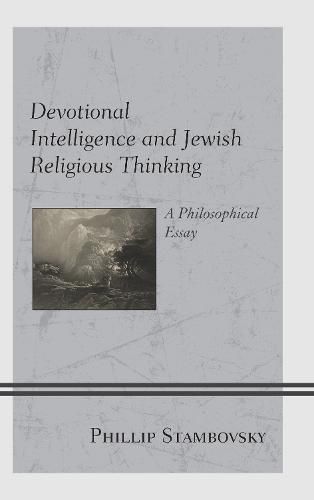Readings Newsletter
Become a Readings Member to make your shopping experience even easier.
Sign in or sign up for free!
You’re not far away from qualifying for FREE standard shipping within Australia
You’ve qualified for FREE standard shipping within Australia
The cart is loading…






This groundbreaking neo-Maimonidean work establishes, on independently philosophical grounds, the intellectual warrant of Jewish religious thinking as devotional intelligence. It demonstrates the purchase and intellectual authority of such thinking by appeal to two dialectically interrelated principles: on the one hand, the metaphysical principle that knowing is of being; and, on the other, sacral attunement, a normative principle.
Part I distinguishes this study from leading work in contemporary philosophy of Judaism. It introduces the game-changing bid to privilege intelligence in the onto-epistemological Aristotelian sense, over epistemologically orchestrated, post-Enlightenment reason when it comes to assessing the intellectual soundness of religious thinking.
Part II distills contemporary elements of Aristotle’s onto-epistemological psychology of intelligence that Maimonides incorporated in his philosophy of Jewish religious thinking. Further, it finds in Hegel a bridge between Maimonides’ account of devotional intelligence and a modern Maimonidean science of knowing dedicated to religious thinking.
Part III turns to sacral attunement, foregrounding the normative devotional aspect of devotional intelligence. It probes the intentionality of both onto-epistemological attunement and the sacred relative to the factor of the transcendent. In the process it identifies and applies elements of an existential phenomenology of fundamental attunement that thematize defining realities of the sacral attunement unique to normative Jewish covenantal praxis. A related analysis of the sacred in religious thinking follows, which segues to a chapter on the factor of the transcendent as a seminal constituent of meaning in both the sciences and religion.
Part IV applies and amplifies key findings in light of a signature Jewish devotional theme: the divine names, approached from a signally Maimonidean, apophatic position indexed to the factor of the transcendent as the unconditioned condition (Kant) of intelligible meaning as such. Distinguishing what the divine names indicate from what they refer to, the essay concludes by substantiating the intellectual warrant of Jewish religious thinking as a devotional intelligence of the relation-of identity-in-difference-between the attributive names and the Tetragrammaton.
$9.00 standard shipping within Australia
FREE standard shipping within Australia for orders over $100.00
Express & International shipping calculated at checkout
This groundbreaking neo-Maimonidean work establishes, on independently philosophical grounds, the intellectual warrant of Jewish religious thinking as devotional intelligence. It demonstrates the purchase and intellectual authority of such thinking by appeal to two dialectically interrelated principles: on the one hand, the metaphysical principle that knowing is of being; and, on the other, sacral attunement, a normative principle.
Part I distinguishes this study from leading work in contemporary philosophy of Judaism. It introduces the game-changing bid to privilege intelligence in the onto-epistemological Aristotelian sense, over epistemologically orchestrated, post-Enlightenment reason when it comes to assessing the intellectual soundness of religious thinking.
Part II distills contemporary elements of Aristotle’s onto-epistemological psychology of intelligence that Maimonides incorporated in his philosophy of Jewish religious thinking. Further, it finds in Hegel a bridge between Maimonides’ account of devotional intelligence and a modern Maimonidean science of knowing dedicated to religious thinking.
Part III turns to sacral attunement, foregrounding the normative devotional aspect of devotional intelligence. It probes the intentionality of both onto-epistemological attunement and the sacred relative to the factor of the transcendent. In the process it identifies and applies elements of an existential phenomenology of fundamental attunement that thematize defining realities of the sacral attunement unique to normative Jewish covenantal praxis. A related analysis of the sacred in religious thinking follows, which segues to a chapter on the factor of the transcendent as a seminal constituent of meaning in both the sciences and religion.
Part IV applies and amplifies key findings in light of a signature Jewish devotional theme: the divine names, approached from a signally Maimonidean, apophatic position indexed to the factor of the transcendent as the unconditioned condition (Kant) of intelligible meaning as such. Distinguishing what the divine names indicate from what they refer to, the essay concludes by substantiating the intellectual warrant of Jewish religious thinking as a devotional intelligence of the relation-of identity-in-difference-between the attributive names and the Tetragrammaton.